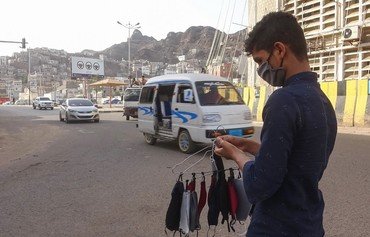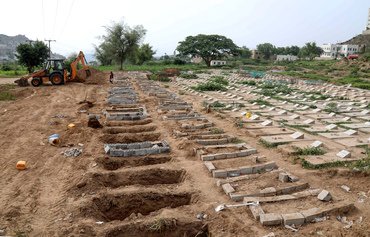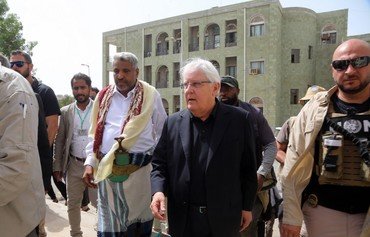Yemen's health system, already strained after five years of war, is teetering on the brink of collapse as it contends with the additional pressure of the novel coronavirus (COVID-19) pandemic, Yemeni and international officials warned.
To add to these challenges, a range of aid programmes, including those to address the COVID-19 crisis, could be cut in the coming weeks due to funding shortages, the UN warned May 22nd.
In a bid to boost support for Yemen, the UN and Saudi Arabia will host a donor conference on Tuesday (June 2nd), AFP reported.
"We are urging the donors to pledge generously, and those who have given an indication of pledges to actually pay early because the operation in Yemen is severely, severely underfunded," said Jens Laerke, a spokesman with the UN Office for the Co-ordination of Humanitarian Affairs (OCHA).
"If we do not get the money coming in, the programmes that are keeping people alive and that are very much essential to fight back against COVID will have to close," he said.
Laerke said the UN estimated it needed some $2 billion to keep essential programmes running in Yemen for the remainder of the year. He said just $677 million had been donated so far this year, compared with over $4 billion in 2019.
"Yemen is really on the brink right now. The situation is extremely alarming," Laerke said.
Yemen has officially recorded 49 deaths, but Doctors Without Borders (MSF) said May 21st that at least 68 virus patients had died at its Aden facility in the first half of May alone -- calling it the "tip of the iceberg".
Laerke said the UN was "working on the assumption that there is already widespread communal transmission going on".
MSF said the number of patients being admitted to its Aden treatment centre -- the only dedicated COVID-19 facility in the whole of southern Yemen -- "speaks to a wider catastrophe unfolding in the city".
'A real health catastrophe'
Minister of Public Health and Population Nasser Baum announced the receipt of an installment of 100 intensive care beds provided by the World Health Organisation (WHO).
They will be distributed to Yemeni provinces to help fight the pandemic, he said.
"The National Medical Supply Programme in Hadramaut also has received the second batch of medical aid for fighting the coronavirus provided by the King Salman Centre for Humanitarian Aid and Relief (KSRelief)," he said.
Five trucks carrying medical aid provided by the Emirati Red Crescent were delivered to the National Drug Supply Programme in Aden, Baum said, noting that the aid will be distributed to all provinces.
Yemen is experiencing a real health catastrophe due to the coronavirus pandemic, said Eshraq al-Sebai, spokeswoman for Yemen's supreme emergency committee for combatting COVID-19.
"The lack of laboratory equipment to test suspected cases, along with the large number of fatalities in Aden, puts us up against a difficult and disastrous reality that threatens the lives of many residents," she told Al-Mashareq.
She called on international organisations to designate isolation hospitals and centres to coronavirus patients and support Yemen by providing equipment, especially personal protective equipment (PPE) for health workers.
"They are the first line of defence," al-Sebai said.
Need for 'accelerated' support
"Support to Yemen must be provided at an accelerated pace to prevent the number of infections from multiplying," Deputy Minister of Health Abdul Raqeeb al-Haidari told Al-Mashareq.
Mobile hospitals and the provision of testing supplies in all provinces "will reveal the extent of the spread of the pandemic in Yemen", he said, noting that many patients are dying without the cause of death being ascertained.
Abdul Raqeeb praised the WHO's proposals with regard to "the deployment of ships equipped with mobile hospitals to cope with the coronavirus outbreak".
Aden and Yemen "need real and urgent support from the international community and UN organisations to fight the coronavirus", said Mohammed Rubeid, deputy general manager of the Aden Health and Population Office.
The number of victims is multiplying amid a severe shortage of medical supplies and test kits and a shortage of medical staff, who fear infection after a number of them contracted the virus, he told Al-Mashareq.
"Doctors are torn between two options," he said: "To stop working, or continue to perform their duties amid a lack of resources, especially PPE."

![Mask-clad security guards stand at the entrance of al-Kubi hospital in Aden on May 17th, amid fears that coronavirus is spreading unhindered in the Yemeni city. [Nabil Hasan/AFP]](/cnmi_am/images/2020/05/28/24241-Yemen-Aden-hospital-600_384.jpg)






